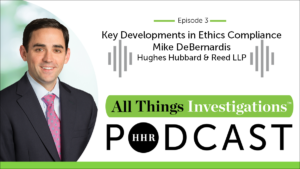When beauty company Avon Products Inc. was charged in 2014 with violating the Foreign Corrupt Practices Act (FCPA) due to failure to detect and prevent bribery acts happening in China, they settled for ten times more than the cost they paid for in “gifts.”
Today, the FCPA investigation and enforcement action still stand as one of the most interesting cases for companies and compliance professionals to learn much from.
Tune in to this new episode of The Corruption Files — The Avon China Bribes with Tom Fox and Michael DeBernardis.
Key points discussed in the episode:
- Tom Fox shares the background facts on such an “insane case,” with the investigation almost as interesting and important as the resolution.
- Michael DeBernardis states that Avon China Bribes the grandfather case for a couple of other similar FCPA cases.
- The internal audit department identified this issue of paying gifts and recommended FCPA training for the team, which did not push through due to the lack of budget.
- In-fighting or territoriality is not surprisingly uncommon at big companies, leading to compliance and corruption problems.
- Tom cites how in 2012, the government became so frustrated with Avon that they started issuing grand jury subpoenas for individuals.
- A key part of the corporate process is to have systems that talk to each other. And if you don’t, the costs can be astronomical.
- Avon’s $8 million in bribes led to $500 million in pre-settlement costs, $135 million in settlement costs, and $250 million in post-settlement resolutions.
- Tom reminds companies that if there’s a potentially high reward, it generally means there’s a high risk.
- Michael emphasizes that Compliance budgets can be tight, but skipping small training can catch up with you in the long run.
—————————————————————————-
Do you have a podcast (or do you want to)? Join the only network dedicated to compliance, risk management, and business ethics, the Compliance Podcast Network. For more information, contact Tom Fox at tfox@tfoxlaw.com.


 The Instrumentality Ruling of United States v. Esquenazi with Tom Fox and Michael DeBernardis
The Instrumentality Ruling of United States v. Esquenazi with Tom Fox and Michael DeBernardis The Esquenazi decision is vital in providing clear guidance for businesses to design robust compliance programs to address corruption, avoid making grease payments to foreign government officials, and remove the temptation to cull business favors and advantages for their company.
The Esquenazi decision is vital in providing clear guidance for businesses to design robust compliance programs to address corruption, avoid making grease payments to foreign government officials, and remove the temptation to cull business favors and advantages for their company.
